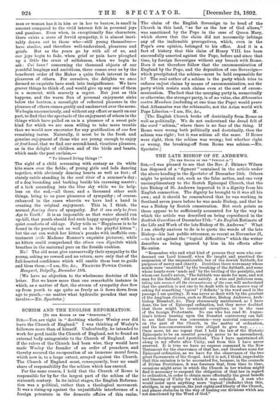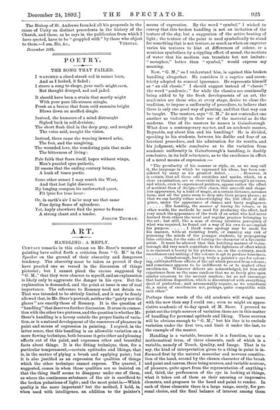THE 14 A.TE BISHOP OF ST. ANDREWS.
CTO THE EDITOR OF THE " SPECTATJR.1 SIR,—I was pleased to see that the Rev. J. Skinner Wilson has disposed of a "figment " contained in the article under the above beading in the Spectator of December 10th. Others might be pointed out, such as the false notion, and one very uncomplimentary to the Scotch Episcopal Church, that the late Bishop of St. Andrews imported to it a dignity from his English connection. The dignity he brought to it was all his. own ; and it should be remembered that he was working in Scotland seven years before he was made Bishop, and that he was a Bishop by Scotch consecration. But such points as these appear to be sufficiently accounted for by the way in which the article was described on being reproduced in the Scottish Guardian of December 17th: "An English Estimate of the Life and Work of the late Bishop of St. Andrews." What I am chiefly anxious to do is to quote the words of the late Bishop—his last public utterance, so recent as November 21, —to be set against the "logical difficulties" which the writer describes as being ignored by him in his efforts after Re-union.
"Remember who and what kind of persons they were who con- demned our Lord himself, when He taught and practised the suspension of the unquestionable law of the Jewish Sabbath, for purposes of mercy and charity. Doubtless there were many whose minds were 'unsettled' by the breaking of the Sabbath, and some whose hearts were 'made sad' by the healing of the paralytic, and whom our Lord's axiom, The Sabbath was made for man, and not man for the Sabbath,' did not satisfy. A wise and judicious man) taking into accoul,t all the circumstances of the case, will understand that the question is not one to be dealt with in the narrow way of asking for something ' definite' is the word used in the passage I am quoting). It was never so dealt with by the greatest of the Anglican divines, such as Hooker, Bishop Andrewes, Arch- bishop Bramhall, &c. They strenuously maintained, as I have done, the law of Episcopal ordination, but they never doubted that there might be occasional exceptions, as in the case of the foreign Protestants. No one who has read St. Angus- tine's letters bearing upon the Donatist controversy can fail, to see that there was concession—very material concession— on the part of the Church, in the matter of ordination, and the non-concessionists were obliged to give way Once more, let me repeat that I hold the law of the Historic- Episcopate to be an essential principle never to be surrendered, because Scriptural and Apostolical. This I have maintained alL along in my efforts after Unity, and from this I have never swerved. It is true we have no express command in the New- Testament for the observance of that law, and therefore none for Episcopal ordination, as we have for the observance of the two- great Sacraments of the Gospel. And it is not, I think, improbable that this omission is to be accounted for, because, in the counsels of Divine Providence, it was foreseen that, from time to time, occasions might arise in which the Church in her wisdom might- find it necessary to suspend the obligation of that law in regard, to ordination, in order to obtain more effectually the great benefit and blessing of Unity for which it was ordained. A man who would insist upon anything more 'logical' (definite) than this, abridges, in my opinion, the just rights and liberty of the Church, and places obstacles in the way of healing our divisions which are not sanctioned by the Word of God."
The Bishop of St. Andrews founded all his proposals in the cause of Unity on distinct precedents in the history of the Church, and these, as he says in the publication from which I have quoted, have to be "grappled with" by those who object December 19th.



































 Previous page
Previous page